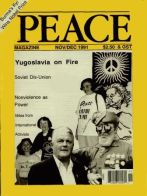
Peace Magazine Nov-Dec 1991, page 23. Some rights reserved.
Search for other articles by Shirley Farlinger here
The government of Myanmar (Burma) held a general election in May, 1990 but the military rulers have prevented the elected representatives from taking office. Murray Thomson, Penny Sanger and eight others have formed a Friends of Burma group to bring this injustice to international attention. Shirley Farlinger recently interviewed Murray Thomson.
Farlinger: You have taken a great interest in Myanmar recently. Should I be calling it by its old name, Burma?
Thomson: The present government wants it called Myanmar but most of the people of the country want to keep the old name.
Farlinger: Then we'll stick with Burma. What has happened to Burma under military rule?
Thomson: For the last 29 years military governments have devastated Burma's teak forests and squandered its natural resources as well as escalating civil war among the ethnic minorities. Since the election last year the government has refused to allow Members of Parliament to take office, in fact it has imprisoned many of them including the leader Aung San Suu Kyi. She is the daughter of the Burmese hero who liberated the country from the Japanese and British and was assassinated in 1947. For the last year-and-a-half she has been under house arrest. In the election two democratic parties won 457 out of 485 seats. The largest party, the National League for Democracy, won 80 per cent of the seats.
Farlinger: What have you done to help?
Thomson: We organized a support group called the Friends of Burma and it sponsored an international seminar in Ottawa on Feb. 28. More than 100 participants from Burma, Thailand, Britain and the United States called on the United Nations and their own governments to recognize the National Coalition Government of the Union of Burma and to try to get Aung San Suu Kyi released. We also found out that Amnesty International has had a campaign to release prisoners which describes the torture and death of Burmese students. The United Nations Human Rights Commission has drawn attention to the repression of human rights and the Lawyers Committee for Human Rights in New York has published a booklet on military tribunals in Burma.
In June I travelled to northern Thailand to meet with leaders of the Democratic Alliance of Burma and the provisional national government headed now by Dr. Sein Win and representatives of international non-governmental organizations. There were two from Germany, three from the U.S. and one from Britain. It was supposed to be a secret meeting but everyone seemed to know we were there. On the way back I went to an international conference in Finland supported by the International Council for Adult Education. The meeting endorsed the establishment of a Network on Peace and Human Rights and it has initiated an education program on human rights in Burma.
Farlinger: What is the attitude of our government?
Thomson: The Canadian government wants the results of the 1990 election respected by the military regime and has called for the release of Aung San Suu Kyi.
However it has taken a hands-off approach to Petro Canada's involvement, one which our group has challenged. Petro Canada does oil exploration there.
Farlinger: What can we do about the exploitation of the teak forests?
Thomson: All governments should ban the import of teakwood. This trade is organized by government forces working with local strongmen with connections to the drug trade. Villagers who object are forced to flee the jungle or leave their rice paddies and take up subsistence agriculture using slash and burn methods.
Farlinger: What do you hope the U.N. will do?
Thomson: I would like the U.N. to remove the regime's cloak of legitimacy by withdrawing the seat from the present representative of Burma and giving it to the provisional National Coalition government. Also, the U.N. Development Program aid could be withdrawn until the government changes.
Farlinger: What else do you plan to do?
Thomson: I hope to go to embassies in Ottawa and visit the diplomatic missions at the U.N. I did that in a limited way in the Gulf War. I phoned all the diplomatic missions of members of the Security Council asking them to call an immediate meeting of the Security Council before the war actually started. I had talks with those from France, India and Cuba trying to get them to take some initiative. You know we used to hold diplomats' conferences at Grindstone Island in the '60s when I was Peace Secretary with the Canadian Friends Service Committee. And I used to spend time at the U.N. working on disarmament issues. We should try to do more of that whether or not there is much chance of success.
Farlinger: What are some of the problems in getting other countries to help?
Thomson: It's a difficult time because so many other countries are in crisis. The opposition has seemed safe on a small piece of land in the mountains close to the border with Thailand, where it has been hard for the military to get at them. But this will change when the Chinese send new planes and weapons. The Chinese are getting teak and jade for the weapons. That's why we have to work quickly.
Write the Prime Minister and Minister of External Affairs asking them to:
Write to General Saw Maung, Head of the State Law and Order Council urging the immediate release of Aung San Suu Kyi and all other political prisoners.

Peace Magazine Nov-Dec 1991, page 23. Some rights reserved.
Search for other articles by Shirley Farlinger here